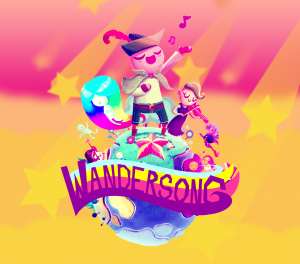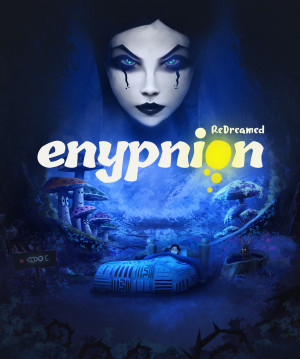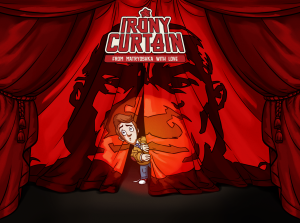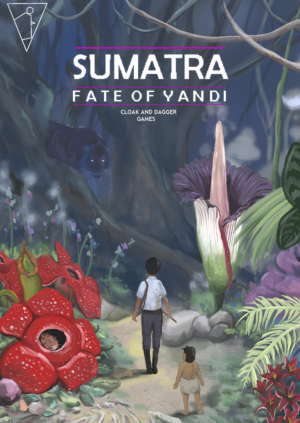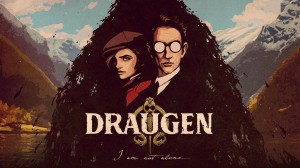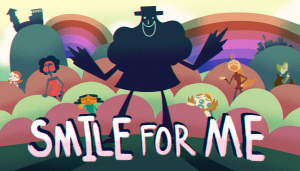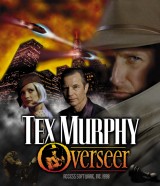Review for Wandersong
Throughout recorded human history there have always been thinkers and poets who put forth the idea that music, and those who make it, are capable of moving much more than hearts. O'Shaughnessy's "Ode" posits that musicians are:
World-losers and world-forsakers,
On whom the pale moon gleams:
Yet we are the movers and shakers
Of the world for ever, it seems.
Indeed folklore, mythology and modern fantasy fiction alike hold a special place for song: Philologist Elias Lönnrot collected and catalogued Finland's ancient folk tradition of singing Magic Songs for the purposes of enchantment; in Greek myth, Orpheus' song moved the rulers of the underworld to return the soul of his beloved Eurydice; while J. R. R. Tolkien established the notion of music as the generative force behind the creation of his entire universe in The Silmarillion.
With the legendary power of music a vital feature in so many cultures, you'd imagine that we would have had more games employing music as a powerful mechanic central to the core experience, and yet one is hard-pressed to find many substantial offerings past Loom, a game in which music-making was the character’s main form of action. The same is true of Greg Lobanov’s Wandersong, a delightfully uplifting side-scroller that deserves a place alongside Brian Moriarty's fantastic LucasArts masterpiece as one of the genre’s great musical adventures.
Wandersong winds music around the very center of its world's mythos: In the beginning, the universe was set in motion by the song of the goddess Eya. Reality as it is known in this world is preserved by colorful creatures called the Overseers – spiritual embodiments of concepts and elements of existence itself. This system seems to work quite well for creation in general... until something starts going wrong, of course.
Enter our plucky protagonist, the bard (whose canonical name is 'Kiwi' but who can be renamed by the player). He is a relentlessly optimistic young musician, not particularly outstanding in anything except for his gift of music-making. After testing the bard's mettle in a dream, Eyala, an emissary of the goddess Eya, takes a liking to him and entrusts him with the knowledge that the goddess sung existence itself into being... and that every couple of aeons or so, she ends all existence in order for Eya to begin the process all over again.
To prevent this from happening, the emissary tells Kiwi that someone must collect the fragments of the Earthsong from each Overseer, and then get the entire world to perform it. This, and only this, will prevent all life from ending. In all of the cycles of creation, destruction and rebirth that Eya has orchestrated, this has never actually occurred.
Piece of cake, right?
Naturally, given his positive nature, the bard embarks on this undertaking with a glad heart and an open spirit. He is accompanied in his travels by the witch Miriam, a sullen, cranky and sarcastic deuteragonist who provides the perfect contrast to the chipper protagonist.
The writing and pacing of each of Wandersong's seven acts fit the general shape of all grand adventures: our dynamic duo travel to a new location, meet interesting people, and uncover problems that need to be solved. There are warring kingdoms, a haunted inn, a city that has succumbed to soulless mechanization, a city of magicians who live above the ground, mermaids, distressed trolls, a disbanded musical group and (of course) pirates.
For an apocalyptic story, Wandersong is largely presented with a light-hearted and whimsical focus, though this is not to say that the tale is devoid of pathos: there are moments of darkness and despair, and some grim and truly imposing threats make appearances at several steps on the journey, their menace only made more palpable by the sunny affability that is interrupted by their presence.
Kiwi will cultivate friendships with a large number of people along the way, but his deepest relationship is with Miriam. As they face hardships, the two confide in each other and show things to the other that they don't reveal to the rest of the world. They become steadfast friends who keep each other from faltering, even when all hope seems lost.
The act of bringing people together with music is a recurring element in many of the bard's encounters. He relays a ghost's doleful song to her grieving mother, who happens to be the queen of a warring kingdom, offering the chance of reconciliation. He becomes the glue that binds the members of an aimless touring music band by inspiring them with his gift for melody. He partakes in spirited sea-shanties with pirates and even guides the ship with their song later in the game.
Our heroes' progress is thwarted constantly by a recurring antagonist, but to say more in any detail would spoil one of the nicer twists in the game. Even though it occurs fairly early on, I found it such a delicious upsetting of a conventional narrative trope that the player should experience it firsthand.
The game is designed as a side-scrolling puzzle-platformer, with the bard's Song Wheel being his primary puzzle-solving tool. An ingenious and simple mechanic, any time you click either mouse button, a large multi-colored wheel spanning a musical octave pops up. By directing the cursor towards any of the eight colored segments, Kiwi will sing the corresponding note.
The bard’s singing causes a wide variety of effects in the environment, ranging from the purely cosmetic (certain fauna changes color depending on the note) to mechanical (Kiwi can recruit birds to fly around him and help him attain higher jumps). Several locations apply unique mechanics to the Song Wheel, allowing you to move platforms, rewind time, cast magic, make plants grow in a specific direction, etc.
Wandersong guides you in knowing what to play in order to achieve certain effects with clever design: It is not necessary to memorize combinations of notes, as each level gives you the feedback needed to advance. Fauna and flora will react to specific notes in different ways, and the game encourages trial-and-error. In the city of Mohabumi, where music is used to cast certain spells by hitting a specific combination of notes (the only time in which the game resembles the mechanics in Loom), the bard writes down the combinations in his mini-map (in the form of directional arrows corresponding to note positions in the Song Wheel) for quick reference.
The puzzles themselves are not hard. One of my favorites involves the protagonist manipulating the growth of plant-based platforms in order to help him traverse a level, but many others also come about because of his unique personality: as a staunch pacifist, he refuses to harm any living thing unless he has no other choice. This puts him in a tricky spot when he traverses a cave that is crawling with insect life and he must navigate the landscape in order to avoid stepping on them. In true fairy tale narrative fashion, he will be rewarded for this later on.
The controls are straightforward and simple: the WASD keys are used for movement, the spacebar to jump, and you use another key for interacting with people and objects. If you don't want to use the mouse to summon the Song Wheel, the numpad can also be used to sing notes. There is even a button to make the bard dance, as well as change the dance he performs. These dances are awarded to him by a mysterious masked figure who likes to lurk in hard-to-reach, hidden places throughout each act. The dances are purely cosmetic, but they are charming and include a cheerful shuffle, balletic pirouettes and even... yes... dabbing. For those who are more comfortable playing with a gamepad, Wandersong does have full controller support.
The platforming handles smoothly, with responsive controls that make manruvering through the environment very easy. It is possible to die in the game, especially during dungeon puzzles, but there is no penalty outside of the mild inconvenience of respawning immediately at a nearby checkpoint. There is a perceptible spike in difficulty during the dungeon levels, upping the challenge in an otherwise very forgiving game. Fortunately these increases aren’t excessive, and they never feel too out of step with the rest of the experience.
While Wandersong is not combat-heavy, there are some areas in which the bard will face enemies in encounters similar to boss fights. During these confrontations, he can use his Song Wheel to attack, defend himself and deflect attacks back. No two boss fights are exactly the same: some require using specific notes to defend based on either the direction of the attack or the 'color' of the attack which corresponds to notes on the Song Wheel, for example. There are also rhythm and memorization mini-games, which can appear as part of a puzzle or a boss fight. The correct course of action in these scenarios is easily intuited as the visuals provide the necessary hints without the need for lengthy explanations.
The artistic design uses a minimalist paper cut-out style, replete with charm and perfectly suited to the general tone of the game: characters 'flip' and become completely flat as they do an about-face, grass looks like waving cellophane paper, and rolling hillsides have diagonal patterns reminiscent of gift-wrapping paper. Character design is also highly stylized, but even the simplest models have sufficient levels of detail and color to identify who they are. This is a game that has received a lot of loving attention to make its visual language a lively one, from the endearing way in which the bard puts a hand on his chest and extends his arm when singing, to the way the world vibrates and reacts to his music. Color palettes range from vivid and striking to muted and subdued where appropriate.
It would be a crime if a game featuring the concept of music at its core suffered from a lackluster soundtrack. Fortunately, composer Gordon McGladdery's score rises to meet the scope and atmosphere required. His rich instrumentation sees the use of toy piano, bells and similar percussive instruments alternating with jaunty voices singing joyfully and softly in the background during serene, almost pastoral scenes, but he is also capable of ethereal and otherworldly soundscapes that are very descriptive of their dreamlike locales. Boss fights are accompanied by appropriately upbeat and urgent pieces, and the many times in which Kiwi performs important songs are all memorable and quite catchy.
Every location has a distinctive musical identity that marries perfectly with its visual style. The town of Delphi, for example, is surrounded by perpetual autumn and its houses have facades painted in reds, oranges and soft purples. To this idyllic locale, McGladdery spins a theme consisting of a melancholy bassoon and woodwinds over a sustained piano accompaniment, the pensive atmosphere becoming accentuated by the interplay of strings and a wistful bandoneon that meanders in an intimate dialogue, only to drop out and leave a solitary piano to disappear into quietude. The effect is breathtaking, equal parts Astor Piazzolla and Yann Tiersen, and wholly spellbinding.
There are easily four hours of original compositions included in the game, and the soundtrack is available for purchase separately in two volumes (plus an EP and an album consisting of remixes). For music lovers it is highly recommended in order to fully appreciate its variety and inventiveness.
Em Halberstadt's sound design is also spot-on. While there is no voice acting, characters do make many different sounds and little exclamations, all of which are tastefully done. Likewise, the ambient sounds and special effects are crafted with care and character. Halberstadt's attention to telling stories through audio is on full display in Wandersong, where every environment has a distinctive acoustic identity, and every character interaction is replete with vocalizations that underline both the mood and the personality of the parties involved.
It takes about ten hours to reach the end, including some of the bonus content (collecting all of the dances plus a special area that can only be accessed after you have finished the game), which is the right length for this type of story, told in this manner. The experience was entirely glitch-free for me, running smoothly without any noticeable errors, further reflecting its overall degree of polish.
Wandersong is a breath of fresh air that uses its musical mechanics with inventiveness and a sense of playfulness to tell a story that, although it may appear simplistic at first glance, has an honest core of optimism in the face of adversity that feels very appropriate for our day and age. The friendship between the bard and Miriam, with its lessons on vulnerability, gratefulness, and acceptance of very different attitudes towards life, is something that isn’t explored very often with this level of honesty in games. Players are sure to find their trek through Wandersong a heartwarming experience that delivers a moderate challenge, a vibrant world, an impressively varied soundtrack, and a generous amount of smiles.





